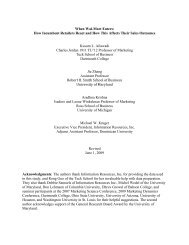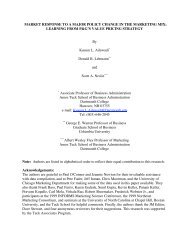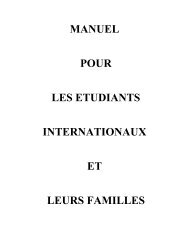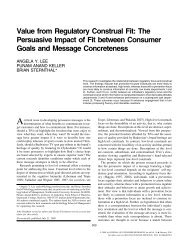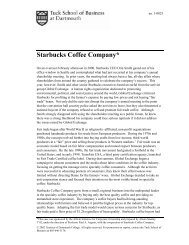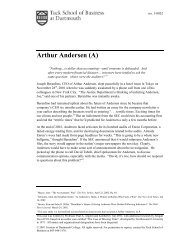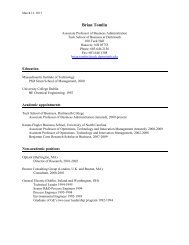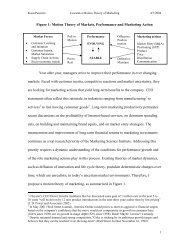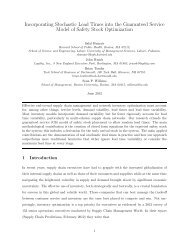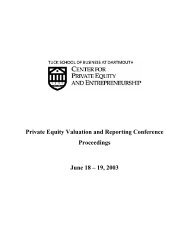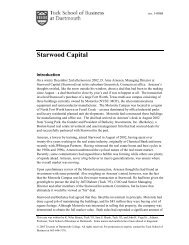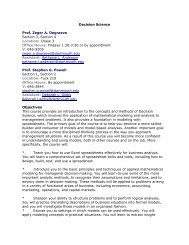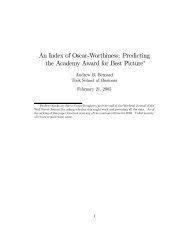tax notes international - Tuck School of Business - Dartmouth College
tax notes international - Tuck School of Business - Dartmouth College
tax notes international - Tuck School of Business - Dartmouth College
You also want an ePaper? Increase the reach of your titles
YUMPU automatically turns print PDFs into web optimized ePapers that Google loves.
has operations in Germany and subsidiaries across the<br />
world, including two in India. During the year under<br />
consideration, the German arm <strong>of</strong> Epcos AG supplied<br />
services such as marketing, sales support, and technology<br />
support to the Indian subsidiaries in return for royalty<br />
payments.<br />
In its Indian <strong>tax</strong> return, the German arm <strong>of</strong> Epcos<br />
AG classified the payments it received from the Indian<br />
subsidiaries as royalties and fees for technical services,<br />
which were subject to Indian income <strong>tax</strong> at a rate <strong>of</strong><br />
10 percent under article 12 <strong>of</strong> the Germany-India income<br />
<strong>tax</strong> treaty.<br />
The Indian <strong>tax</strong> <strong>of</strong>ficer requested details about the<br />
services supplied to the Indian subsidiaries by the assessee,<br />
and the company submitted that sales are<br />
handled by Epcos AG’s regional sales <strong>of</strong>fices, whereas<br />
marketing efforts are centralized at the German headquarters<br />
in Munich.<br />
The company said it is organized by product divisions,<br />
and each division has a central marketing team<br />
that works for all the manufacturing subsidiaries in that<br />
division. Epcos AG charges an arm’s-length fee for the<br />
services that the central marketing team renders for the<br />
benefit <strong>of</strong> the various manufacturing subsidiaries.<br />
The transfer pricing <strong>of</strong>ficer (TPO) agreed that the<br />
services provided by the assessee were supplied to the<br />
Indian subsidiaries on an arm’s-length basis, as required<br />
by the transfer pricing provisions <strong>of</strong> the ITA.<br />
The <strong>tax</strong> <strong>of</strong>ficer, however, thought that the assessee<br />
had a PE in India in the form <strong>of</strong> the two subsidiaries<br />
because the assessee was conducting its business in India<br />
through those subsidiaries and more specifically,<br />
through the employees <strong>of</strong> the subsidiaries. He classified<br />
the payments at issue as business pr<strong>of</strong>its under article 7<br />
<strong>of</strong> the Germany-India <strong>tax</strong> treaty and assessed <strong>tax</strong> on a<br />
gross basis at the 20 percent rate provided under the<br />
ITA. (For the year in question, the ITA did not allow a<br />
deduction for any expenses related to royalties and fees<br />
for technical services earned by a foreign company.)<br />
The commissioner <strong>of</strong> income <strong>tax</strong> (appeals) subsequently<br />
overturned the assessment, holding that the<br />
services supplied by Epcos AG were routine in nature<br />
and were provided to enable the Indian subsidiaries to<br />
carry on their own business activities, and not the business<br />
<strong>of</strong> the assessee. The Revenue Department then<br />
appealed to the tribunal.<br />
The Tribunal’s Decision<br />
In the tribunal’s own words, the commissioner <strong>of</strong><br />
income <strong>tax</strong> (appeals) properly rejected the <strong>tax</strong> <strong>of</strong>ficer’s<br />
‘‘overzealous approach.’’<br />
The tribunal held that a <strong>tax</strong> treaty generally provides<br />
for an alternate <strong>tax</strong> regime and not an exemption regime.<br />
Therefore, the burden is first on the Revenue Department<br />
to show that the assessee has <strong>tax</strong>able income<br />
under the treaty, and then the burden is on the assessee<br />
to show that its income is exempt under the treaty. Unless<br />
a <strong>tax</strong> jurisdiction has a right to <strong>tax</strong> an income, it is<br />
irrelevant whether, under the domestic <strong>tax</strong> legislation<br />
<strong>of</strong> that <strong>tax</strong> jurisdiction, the income in question is <strong>tax</strong>able.<br />
In a situation in which India has no right to <strong>tax</strong> a<br />
particular income in the hands <strong>of</strong> the nonresident covered<br />
by a <strong>tax</strong> treaty, the provisions <strong>of</strong> ITA do not<br />
come into play at all.<br />
The tribunal confirmed that when an economic activity<br />
is carried out in a fixed place <strong>of</strong> business available<br />
to a foreign enterprise, that place will be a PE <strong>of</strong><br />
the foreign enterprise regardless <strong>of</strong> whether the activities<br />
at issue are core activities or peripheral activities.<br />
However, if the PE carries on an activity that does not<br />
serve the overall purpose <strong>of</strong> the foreign enterprise or<br />
does not contribute to the pr<strong>of</strong>its <strong>of</strong> the foreign enterprise,<br />
the existence <strong>of</strong> such a PE is wholly academic<br />
and does not have any <strong>tax</strong> implications in the source<br />
jurisdiction (in this case, India).<br />
While Epcos AG’s business is to supply certain<br />
types <strong>of</strong> services to its Indian subsidiaries, the business<br />
<strong>of</strong> the Indian subsidiaries is to manufacture and sell<br />
their own products, the tribunal said. The fact that the<br />
employees <strong>of</strong> the Indian subsidiaries were also engaged<br />
in marketing and information technology support activities<br />
does not mean that those employees were doing<br />
the business <strong>of</strong> the assessee, it said.<br />
Further, the TPO had agreed that the payments<br />
made by the Indian subsidiaries to Epcos AG were at<br />
arm’s length, and the assessee had not reimbursed the<br />
subsidiaries for any costs incurred in connection with<br />
their employees in India, and as such, there could not<br />
be any payment for, or in connection with, the services<br />
rendered by those employees.<br />
The tribunal therefore held that the Indian subsidiaries<br />
did not constitute a PE <strong>of</strong> Epcos AG in India, and<br />
that the assesssee was not subject to <strong>tax</strong>ation in India<br />
on royalties or technical service fees paid by the Indian<br />
subsidiaries.<br />
♦ Shrikant S. Kamath, <strong>tax</strong> consultant, Hong Kong<br />
Indonesia<br />
Exit Tax Rules Revised<br />
INDONESIA<br />
Indonesia’s Directorate General <strong>of</strong> Taxation on December<br />
21, 2008, issued Regulation PER-53/PJ/2008<br />
(later amended by PER-1/PJ/2009 <strong>of</strong> January 9,<br />
2009), regarding the procedures for payment, exemption,<br />
and administration <strong>of</strong> the fiscal (exit) <strong>tax</strong> for resident<br />
individuals traveling overseas.<br />
TAX NOTES INTERNATIONAL FEBRUARY 2, 2009 • 397<br />
(C) Tax Analysts 2009. All rights reserved. Tax Analysts does not claim copyright in any public domain or third party content.



